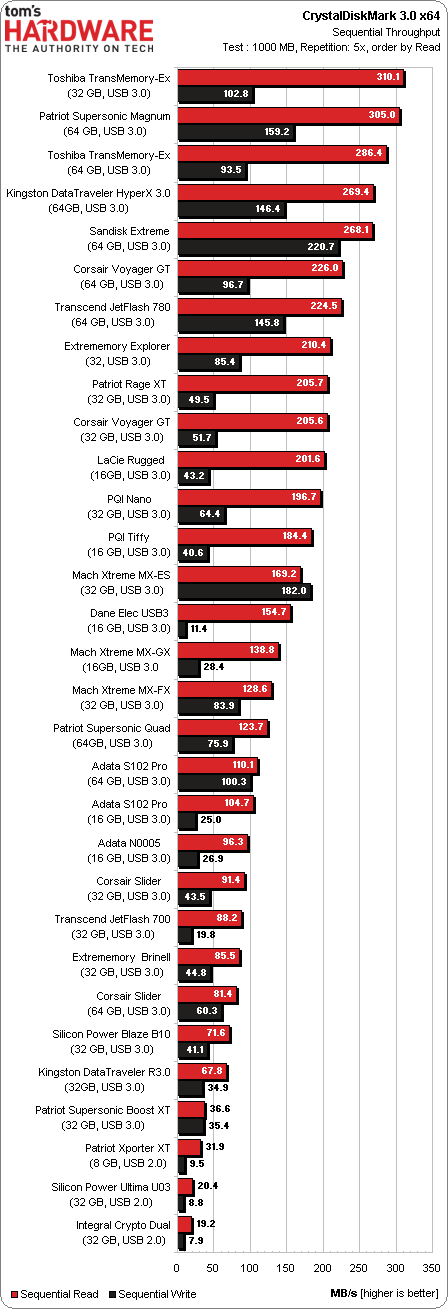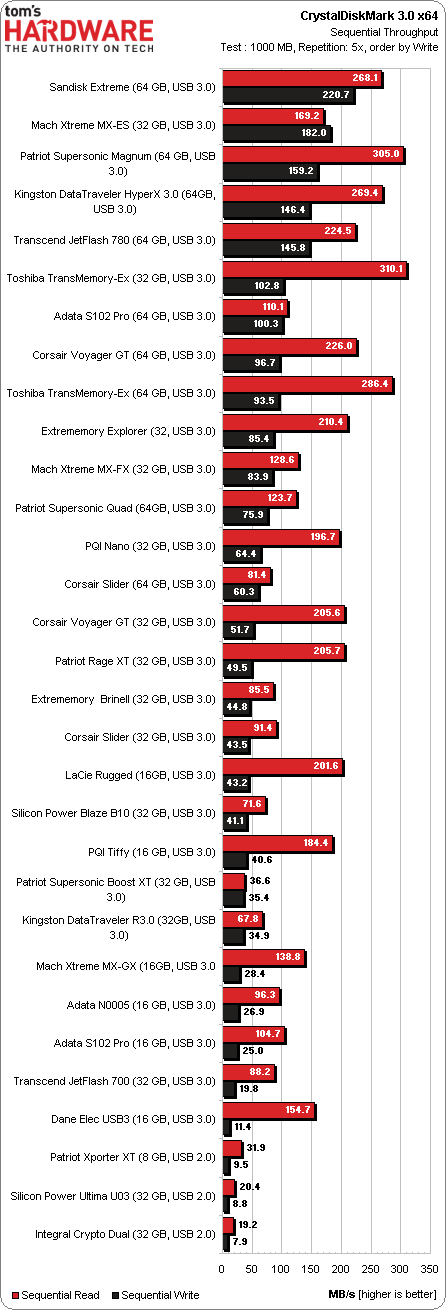31 USB 3.0 Thumb Drives, Tested And Reviewed
It's hard to believe that the fastest USB 3.0-rated thumb drives can outperform the hard drive in your desktop PC. On the other hand, the slowest models shouldn't even be allowed USB 3.0 branding. We test 31 different drives to determine the quickest.
Results: Sequential Read And Write Performance
Why you can trust Tom's Hardware
Toshiba's TransMemory-EX 32 GB and Patriot's Supersonic Magnum achieve sequential read speeds that blow through the 300 MB/s barrier. Even the PQI Nano, which finishes in twelfth place, hits almost 200 MB/s and outpaces any conventional disk drive's top-end read numbers. So, if you read a file from the Nano and write it to your PC's hard drive (even the 3 TB Seagate Barracuda 7200.14, with its impressive 191.5 MB/s sequential write performance), the mechanical device won't be able to keep up.
Of course, these numbers are achieved under perfect conditions, and aren't necessarily representative of real-world performance. The rest of our benchmarks show that you don't have to have an SSD to take advantage of the fastest USB 3.0-capable thumb drives. Really, this is just something to keep in mind if you're really looking for smoking-fast sequentials and are still working with spinning media.
The sequential write performance of these thumb drives is slower than the reads, as we might have expected. SanDisk's Extreme is the only model that outperforms spinning media, and you'd need to hook it up to an SSD-equipped system to achieve the drive's 220.7 MB/s potential.
Four other offerings also turn in impressive numbers in excess of 145 MB/s: the Mach Xtreme MX-ES hits 182 MB/s, Patriot's Supersonic Magnum achieves 159.2 MB/s, the Kingston DataTraveler HyperX 3.0 pushes 146.4 MB/s, and Transcend's JetFlash 780 does 145.8 MB/s.
On the other end of the performance spectrum, the Dane-Elec USB 3.0 finished dead last at 11 MB/s. That sort of performance shouldn't even be allowed to carry a USB 3.0 sticker.
Current page: Results: Sequential Read And Write Performance
Prev Page 31 USB 3.0 Thumb Drives, Rounded-Up Next Page Results: 4 KB Random Read And Write PerformanceGet Tom's Hardware's best news and in-depth reviews, straight to your inbox.
-
psikick It's not a surprise the Sandisk wins because this USB drive is actually a small SSD.. It uses the same controller used in Sandisk's ReadyCache SSD drives... the great thing about it is it is priced reasonably considering.. :)Reply -
Madn3ss795 Been using this usb3.0 *SSD from Sandisk for half a year and I haven't got disappointed.Great device for the price. The only drawback I found is that its enclosure gets quite hot after 15mins of heavy use ( benchmarking ) because heat might reduce a SSD' durability.Reply -
razor512 The sandisk extreme works well.Reply
I currently have the 16GB version (was $20 when I got it)
http://www.flickr.com/photos/razor512/8272978749/does 200MB/s read and 57.3MB/s write
not as good as the the 64GB version but it is still really good
Read speed: http://i.imgur.com/TdcufSg.png
Write speed: http://i.imgur.com/jQVkBCa.png -
daveys93 I have the 32 GB version of the SanDisk Extreme and it is a great thumb drive. The 16 GB version is a bit slow and the 64 GB is a bit expensive for some, the 32 GB is a good middle ground. Here are the benchmarks I used when trying to decide which USB3.0 drive to get:Reply
http://www.whoratesit.com/SanDisk-Extreme-USB-30-32GB/Rating/1466
There is a toggle on that site that allows you to view the benchmark results for all three sizes.
Here is the full whoratesit.com article as a complement to the Toms article: http://www.whoratesit.com/Best-Flash-Drive/Comparison/1#rank1 -
WyomingKnott In my case the limiting factor is the controller / port. I've got three USB 3.0 controllers: On my notebook at work, built into the motherboard at home, and a PCI-E one. The PCI-E one is twice the speed of the lowest one in 4k random writes.Reply
If I were home I'd post the controller and the thumb drive model, but I'm not there so don't ask. -
aznriptide859 Why no Corsair Flash Survivor? :( I love mine, albeit the write times aren't the speediest.Reply -
RedJaron Reply11204798 said:In my case the limiting factor is the controller / port. I've got three USB 3.0 controllers: On my notebook at work, built into the motherboard at home, and a PCI-E one. The PCI-E one is twice the speed of the lowest one in 4k random writes.
If I were home I'd post the controller and the thumb drive model, but I'm not there so don't ask.
Too true, don't forget the controller speed. The Etron controller in my old-ish Z68 board ensures my USB 3.0 devices rarely go above 25 MBps even though I can get double that performance on my newer work computer.

